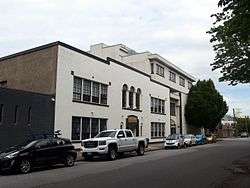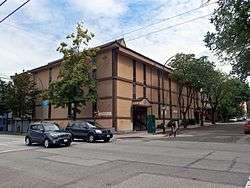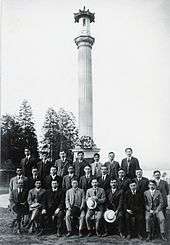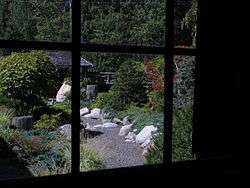Japanese Canadians
| 日系カナダ人 Nikkei Kanadajin | |
|---|---|
  | |
| Total population | |
|
Japanese 109,740 (by ancestry, 2011 Census)  [1] [1] | |
| Regions with significant populations | |
| British Columbia, Alberta, Ontario, Quebec | |
| Languages | |
| English, French, and Japanese | |
| Religion | |
| Buddhism, Shinto, Christianity, Irreligion, Japanese new religions | |
| Related ethnic groups | |
| Japanese, Japanese Americans, Japanese Brazilians, Japanese Peruvians, East Asians |
Japanese Canadians (日系カナダ人 Nikkei Kanadajin, French: Nippo-Canadiens) are Canadian citizens of Japanese ancestry. Japanese Canadians are mostly concentrated in Western Canada, especially in the province of British Columbia which hosts the largest Japanese community in the country with the majority of them living in and around Vancouver. In 2006, there were 98,905 Japanese Canadians throughout Canada (42,435 of whom are of mixed heritage).[2]
Generations
The term Nikkei (日系) was coined by sociologists and encompasses all of the world's Japanese immigrants across generations. Japanese descendents living overseas have special names for each of their generations. These are formed by combining one of the Japanese numerals with the Japanese word for generation (sei 世):
For example, for Japanese living in Canada:
- Issei (一世) – The first generation of immigrants, born in Japan before moving to Canada.
- Nisei (二世) – The second generation, born in Canada to Issei parents not born in Canada.
- Sansei (三世) – The third generation, born in Canada to Nisei parents born in Canada.
- Yonsei (四世) – The fourth generation, born in Canada to Sansei parents born in Canada.
- Gosei (五世) – The fifth generation, born in Canada to Yonsei parents born in Canada.
History
The first Japanese settler in Canada was Manzo Nagano, who lived in Victoria, British Columbia (a mountain in the province was named after him in 1977). The first generation, or Issei, mostly came to Vancouver Island ,the Fraser Valley and Rivers Inlet from fishing villages on the islands of Kyūshū and Honshū between 1877 and 1928. Since 1967, the second wave of immigrants were usually highly educated and resided in urban areas.[3]
Until 1948, Japanese-Canadians—both Issei and Canadian-born Nisei—were denied the right to vote. Those born in the 1950s and 1960s in Canada are mostly Sansei, third generation. Sansei usually have little knowledge of the Japanese language. Over 75% of the Sansei have married non-Japanese. Nisei and Sansei generally do not identify themselves as fully Japanese, but as Canadians first, who happen to be of Japanese ancestry.
The younger generation of Japanese-Canadians born in the late 20th century are mostly Yonsei, fourth generation. Many Yonsei are of mixed racial descent. According to Statistics Canada's 2001 census of population information, Japanese-Canadians were the Canadian visible minority group most likely to marry or live common-law with a non-Japanese partner. Out of the 25,100 couples in Canada in 2001 which had one Japanese person, only 30% had two partners of Japanese descent and 70% included one non-Japanese partner. As of 2001, 65% of Canada's Japanese population was born in Canada.
Internment
In 1942, the federal government used the War Measures Act to brand Japanese Canadians enemy aliens and categorized them as security threats. There were 20,881 Japanese placed in internment camps and road camps in British Columbia; prison of war camps in Ontario; and families were also sent as forced labourers to farms throughout the prairies. Three-quarters of them were Canadian [technically British subjects, as were all Canadians, since Canadian citizenship did not exist prior to 1947]. A parallel situation occurred in the United States. (See Japanese American internment.)[4]
The property and homes of Japanese Canadians living in the province of British Columbia were seized and sold off without consent in 1943. The funds were used to pay for their internment. They also had to "pay rent" for living in the internment shacks they were assigned. In 1945, after the war, as part of the continued effort to remove all Japanese Canadians from British Columbia, Prime Minister MacKenzie King's cabinet used Orders-in-Council to extend the powers of the War Measures Act and Japanese Canadians give two "options": to either be relocated to another province, i.e. "East of the Rockies," or to go "back" to Japan (though most were born in Canada and had never been to Japan). After organized protests by against their treatment, they were finally given the right to vote in 1949. Mobility restrictions were lifted in 1949.
In the late 1970s and 1980s, documents on the Japanese Canadian internment were released, and redress was sought by the National Association of Japanese Canadians, an organization representing Japanese Canadians nationally that was headed by Art Miki from Winnipeg. In 1986, it was shown that Japanese Canadians lost $443 million during the internment. There were 63% of Canadians who supported redress and 45% who favoured individual compensation. On September 22, 1988, the National Association of Japanese Canadians succeeded in negotiating a redress settlement with the government at the time, under the leadership of Prime Minister Brian Mulroney. The settlement included $21,000 for each individual directly affected, that was, by 1993, almost 18,000 survivors. The federal government also provided a community endowment fund to assist in rebuilding the community, which is run by the National Association of Japanese Canadians. In addition, to address the more systemic racism that led to the plan and later justifications of the effort to remove "all people of Japanese racial origin" from Canadian territory, the redress settlement included the establishment of the Race Relations Foundation and challenges to the War Measures Act. The Prime Minister also offered a formal apology in the House of Commons and the certificate of acknowledgement of injustices of the past, which was sent to each Japanese Canadian whose rights had been stripped, incarcerated, dispossessed and forcibly displaced.
Education
Hoshū jugyō kō (Japanese supplementary schools) for instruction of the Japanese language include those in Calgary, Edmonton, Halifax, London, Montreal (Montreal Hoshuko School), Ottawa, Saskatoon, Toronto (Toronto Japanese School), and Vancouver.[5]
Demographics
| Historical population | ||
|---|---|---|
| Year | Pop. | ±% |
| 1901 | 4,738 | — |
| 1911 | 9,067 | +91.4% |
| 1921 | 15,868 | +75.0% |
| 1931 | 23,342 | +47.1% |
| 1941 | 23,149 | −0.8% |
| 1951 | 21,663 | −6.4% |
| 1961 | 29,157 | +34.6% |
| 1971 | 37,260 | +27.8% |
| 1981 | 40,995 | +10.0% |
| 1986 | 54,505 | +33.0% |
| 1991 | 65,680 | +20.5% |
| 1996 | 77,130 | +17.4% |
| 2001 | 85,225 | +10.5% |
| 2006 | 98,905 | +16.1% |
| 2011 | 109,740 | +11.0% |
Japanese Canadians by province or territory
Japanese Canadian population by province and territory in Canada in 2011 according to Statistics Canada:
| Province or territory | Japanese Canadians | Percentage |
|---|---|---|
| | 109,740 | 0.3% |
| | 45,895 | 1.0% |
| | 37,910 | 0.3% |
| | 15,650 | 0.4% |
| | 5,555 | 0.0% |
| | 2,335 | 0.1% |
| | 985 | 0.1% |
| | 530 | 0.0% |
| | 395 | 0.1% |
| | 190 | 0.1% |
| | 145 | 0.4% |
| | 75 | 0.0% |
| | 70 | 0.2% |
| | 10 | 0.0% |
Prominent Canadians of Japanese ancestry
Athletes
Ice hockey
- Martin Kariya, hockey player
- Paul Kariya, NHL star player
- Steve Kariya, hockey player
- Jon Matsumoto, ice hockey player
- Raymond Sawada, hockey player
- Devin Setoguchi, NHL First Liner
- Jamie Storr, ice hockey player
- Vicky Sunohara, Olympic gold medalist in women's hockey
- Herb Wakabayashi, ice hockey player
- Mel Wakabayashi, ice hockey player
Martial arts
- David Akutagawa, martial artist
- Yuzuru Kojima, judoka, Member of the Order of Canada[6]
- Hiroshi Nakamura, judo coach, Member of the Order of Canada[7]
- Shigetaka Sasaki, judoka, member of the Canadian Olympic Hall of Fame
- Yoshio Senda, judoka, former Canadian Olympic judo team coach, first in North America to attain level 9 black belt, Member of the Order of Canada[8]
- Masami Tsuruoka, martial artist, "founder of karate in Canada"
Skiing and snowboarding
- Brian McKeever, Paralympic cross-country skier and biathlete
- Robin McKeever, Olympic cross-country skier
- Emily Nishikawa, Olympic cross-country skier
- Graham Nishikawa, National Team cross-country skier
- Atsuko Tanaka, Olympic ski jumper
- Yuki Tsubota, Olympic freestyle skier
- Katie Tsuyuki, Olympic snowboarder
- Kimiko Zakreski, Olympic snowboarder
Other sports
- Lori Fung, rhythmic gymnast, Member of the Order of Canada[9]
- Nathan Hirayama, rugby union player
- Noriko Kariya, boxer
- Sarah Kawahara, figure skater and Emmy Award winning choreographer
- Glenn Michibata, tennis player
- Issey Nakajima-Farran, Canadian national soccer team player
- Paris Nakajima-Farran, footballer
- Kristy Odamura, softball player
Businesspeople and organizational leaders
- Arthur S. Hara, business leader, Officer of the Order of Canada[10]
- Robert Yasuharu Kadoguchi, community leader, Member of the Order of Canada[11]
- Yutetsu Kawamura, community leader, Member of the Order of Canada[12]
- Genzo Kitagawa, community leader, Member of the Order of Canada[13]
- Art Miki, National Association of Japanese Canadians leader, Member of the Order of Canada[14]
- Masajiro Miyazaki, osteopath/coroner and community activist; Companion of the Order of Canada[15]
- Roger S. Obata, community leader, Member of the Order of Canada[16]
- Grace Eiko Thomson, curator, Nikkei Museum's first director, former president of the National Association of Japanese Canadians, community activist
- Toyoshi Yoshihara, entrepreneur, Member of the Order of Canada[17]
Film and television personalities
- Mio Adilman, radio and television personality, actor
- Nobu Adilman, television personality, actor
- Denis Akiyama, actor
- Brooke Berry, model
- Robert Ito, actor
- Hiro Kanagawa, actor
- Yukiko Kimura, former newscaster
- Andrew Kishino, voice actor
- Nobu McCarthy, actress
- Midi Onodera, filmmaker
- Maria Ozawa, pornographic actress (Japanese father, Quebecois mother)
- Mutsumi Takahashi, news anchor
- Lisa Yamanaka, voice actress for Wanda Li in The Magic School Bus and Yoko in Timothy Goes To School
- Christine Yoshikawa, classical pianist and recording artist
- Catalina Yue, actress, singer, songwriter and recording artist
Musicians and performing artists
- Linda Uyehara Hoffman, one of the founders of Katari Taiko
- Koichi "Jim" Imagawa, drummer for punk rock band Subhumans
- Roy Kiyooka, artist, Officer of the Order of Canada[18]
- Tracy Koga, ballet dancer, television producer
- Ron Korb, musician, composer
- Keri Latimer, musician[19]
- Catherine Manoukian, violinist
- George Nozuka, musician
- Justin Nozuka, singer
- Jon Kimura Parker, classical pianist and recording artist, Officer of the Order of Canada[20]
- Tim Tamashiro, jazz singer, radio broadcaster and speaker
Politicians and government officials
- Bev Oda, first Japanese-Canadian MP and cabinet minister in Canadian history
- David Tsubouchi, former Ontario MPP and cabinet minister[21]
- Arthur Tsuneo Wakabayashi, public servant, Member of the Order of Canada[22]
- Naomi Yamamoto, politician
- Keith Yamauchi, Justice on the Alberta Court of Queen's Bench
Scholars and scientists
- S. I. Hayakawa, Canadian-American linguist, academic and U.S. Senator
- Audrey Kobayashi, professor and redress activist
- Roy Miki, professor emeritus, Simon Fraser University and poet, Member of the Order of Canada[23]
- Mona Oikawa, academic, author, community activist
- Santa J. Ono, biologist, President, University of British Columbia
- Henry J. Shimizu, one of the first Japanese Canadians to practise medicine in Canada, teacher and researcher at University of Alberta, Member of the Order of Canada[24]
- Thomas Kunito Shoyama, economist, Officer of the Order of Canada[25]
- David Suzuki, biologist, environmentalist, host of CBC's The Nature of Things, Companion of the Order of Canada[26]
- Severn Cullis-Suzuki, environmentalist, activist; daughter of David Suzuki
- Irene Ayako Uchida, scientist, Officer of the Order of Canada[27]
- Juhn Atsushi Wada, neuroscientist, professor at University of British Columbia, Officer of the Order of Canada[28]
- Henry H. Wakabayashi, engineer, Member of the Order of Canada[29]
Visual artists
- Lillian Michiko Blakey, artist
- Nina Matsumoto, comics artist
- Kazuo Nakamura, painter
- Jeff Chiba Stearns, animated filmmaker
- Takao Tanabe, artist, Member of the Order of Canada[30]
- Miyuki Tanobe, artist
Writers
- Ken Adachi, author
- Hiromi Goto, author
- Mary Ito, journalist
- Sally Ito, writer
- Joy Kogawa, novelist and poet, Member of the Order of Canada[31]
- Kenzo Mori, editor of New Canadian[32]
- Kim Moritsugu, writer
- Ruth Ozeki, novelist, filmmaker
- Kerri Sakamoto, novelist
- Aki Shimazaki, novelist
- Rick Shiomi, playwright
- Mariko Tamaki, writer
- Connie Tamoto, journalist
- Lindsay Tsuji, journalist
- Takaichi Umezuki, newspaper publisher, Member of the Order of Canada[33]
- Terry Watada, novelist, poet, playwright, historian
- Michelle Sagara West, author
Other
- Bruce Kuwabara, architect, Officer of the Order of Canada[34]
- Seisho Kina Kuwabara, Japanese language and flower arrangement teacher, Member of the Order of Canada[35]
- Raymond Moriyama, architect, Companion of the Order of Canada[36]
- Makoto Ono, chef
- Tsutae Sato, educator, Member of the Order of Canada[37]
- Tetsuro Shigematsu, radio host
- Hide H. Shimizu, educator and community organiser, Member of the Order of Canada[38]
- Ted Teshima, architect
- Mamoru Watanabe, physician, Officer of the Order of Canada[39]
Gallery
-

Vancouver Japanese Language School in Vancouver, BC is the oldest Japanese language school in Canada.
-

Vancouver Buddhist Temple in Vancouver, BC.
-

Founding members of the Canadian Japanese Association at the Japanese Canadian War Memorial in Stanley Park, Vancouver, BC.
-

Nikkei Internment Memorial Centre in New Denver, BC is designated as a National Historic Site of Canada.
See also
- Asian Canadians
- Japanese in Toronto
- Japanese Americans
- Japanese Canadian internment
- Reference re Persons of Japanese Race
- The Vancouver Asahi, 2014 Japanese film described Asahi (baseball team)
- Judo in Canada
References
- ↑ Statistics Canada. "2011 National Household Survey: Data tables". Retrieved 11 February 2014.
- ↑ 2006 Census of Canada: Topic-based tabulations
- ↑ Ken Adachi, The enemy that never was: A history of the Japanese Canadians (McClelland & Stewart, 1976)
- ↑ Ann Gomer Sunahara, The politics of racism: The uprooting of Japanese Canadians during the Second World War (James Lorimer & Co, 1981)
- ↑ "北米の補習授業校一覧(平成25年4月15日現在)." (Archive) MEXT. Retrieved on May 5, 2014.
- ↑ Order of Canada citation
- ↑ Order of Canada citation
- ↑ Order of Canada citation
- ↑ Order of Canada citation
- ↑ Order of Canada citation
- ↑ Order of Canada citation
- ↑ Order of Canada citation
- ↑ Order of Canada citation
- ↑ Order of Canada citation
- ↑ Commonwealth and Foreign Awards, Masajiro Miayazaki, records reference, National Archives of Canada.
- ↑ Order of Canada citation
- ↑ Order of Canada citation
- ↑ Order of Canada citation
- ↑ Latimer, Keri. "Singer-songwriter's connection to Japan inspires fundraising concert" CBC. April 15, 2011.
- ↑ Order of Canada citation
- ↑ Miller Thompson: David Tsubouchi
- ↑ Order of Canada citation
- ↑ Order of Canada citation
- ↑ Order of Canada citation
- ↑ Order of Canada citation
- ↑ Order of Canada citation
- ↑ Order of Canada citation
- ↑ Order of Canada citation
- ↑ Order of Canada citation
- ↑ Order of Canada citation
- ↑ Order of Canada citation
- ↑ Cordileone, Elvira. "Kenzo Mori: An impact on two shores," The Star (Toronto). January 22, 2007.
- ↑ Order of Canada citation
- ↑ Order of Canada citation
- ↑ Order of Canada citation
- ↑ Order of Canada citation
- ↑ Order of Canada citation
- ↑ Order of Canada citation
- ↑ Order of Canada citation
Further reading
- Adachi, Ken. The enemy that never was: A history of the Japanese Canadians (McClelland & Stewart, 1976)
- Sunahara, Ann Gomer. The politics of racism: The uprooting of Japanese Canadians during the Second World War (James Lorimer & Co, 1981)
- Ward, W. Peter, The Japanese in Canada (Canadian Historical Association Booklets, 1982) online 21pp
External links
- Multicultural Canada website images in the BC Multicultural Photograph Collection and digitized issues of The New Canadian (Japanese-Canadian newspaper) and Tairiku Jiho (The Continental Times)
- Japanese Canadians Photograph Collection – A photo album from the UBC Library Digital Collections chronicling the treatment of Japanese Canadians in British Columbia during World War II
- Tairiku Nippō – Japanese-Canadian newspaper published between 1907 and 1941, and now digitized by the UBC Library Digital Collections
.jpg)